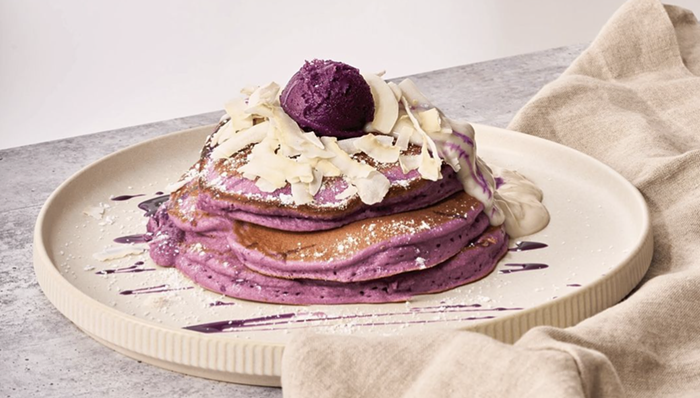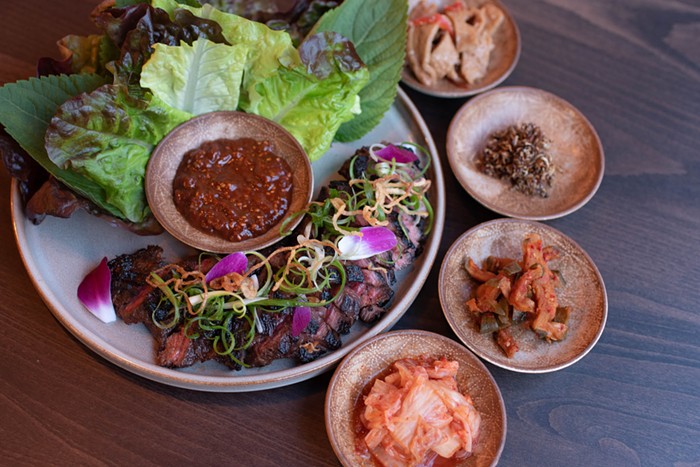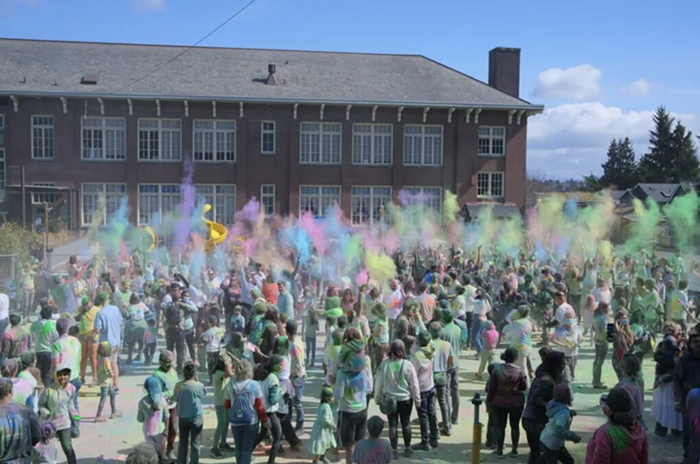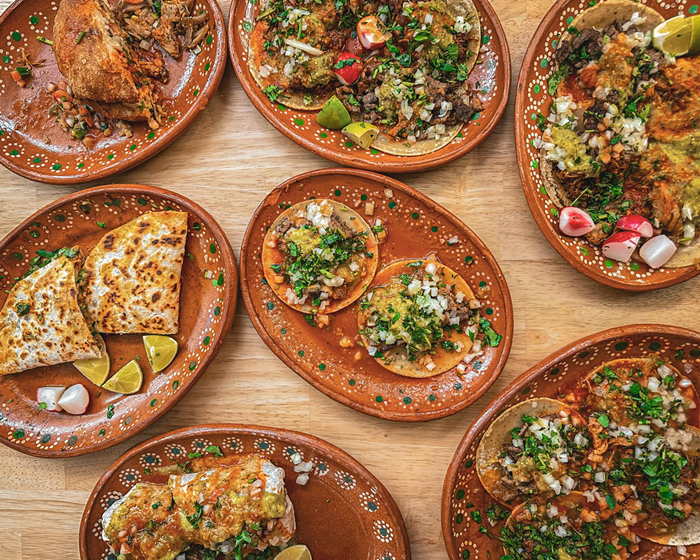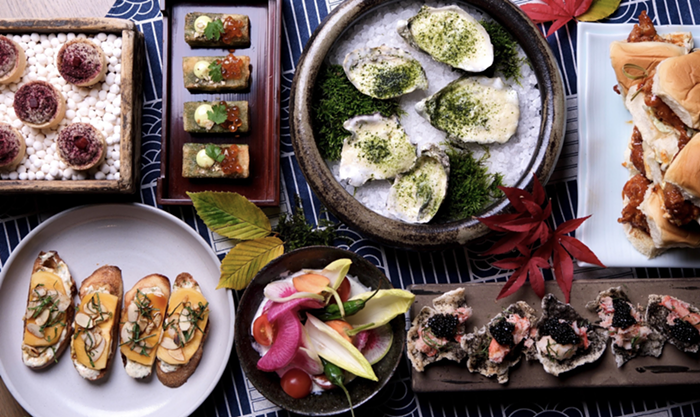Talking about barbecue can be exhausting. A lot of people have a lot to say about the subject, and when they start in, the conversation usually takes a quick turn toward differences and divisions—vinegar versus tomato, pulled versus chopped, rub versus marinade, mesquite versus any other kind of tree on the planet, the favorite local joint versus some shack's worth of paradise three states away. It's too much.
And, of course, people fight over where barbecue came from. Some say the word was passed on from the Taino of Hispaniola to the colonialists of Europe, who promptly knocked them into near extinction. Some say it came from the food served at booze and pool joints, their signs advertising "Bar-Beer-Cue" across the South. Some want to give French interlopers credit, saying they saw Caribbean natives cooking pigs whole, or barbe à queue. ("From beard to tail"? Seriously? Fortunately, most linguistic experts have kicked this theory to the curb—it feels nice to keep barbecue's etymological roots in the New World.)
But all those picayune debates obscure the bright, happy truth: Barbecue brings people together. It is not a class-specific food. Throwing a barbecue has always been a popular way to lobby for votes, both black and white, across the South. It's a meal that poor farmers and rich business owners can enjoy together. It also isn't a race-specific food. Journalist and historian John Egerton has written about the barbecue restaurant being a natural interracial meeting place long before the courts enforced integration in the 1950s and '60s. (Though one South Carolina barbecue restaurant chain, Piggie Park, entered the legal canon in 1968 by appealing its "right" to segregate African Americans all the way to the Supreme Court. Happily, Piggie Park lost its case. The restaurant still thrives.) A graduate student in American Studies at the University of Virginia named Laura Dove has written that barbecue is one thing that all Southerners—besides vegetarians—can rally around: "Without the racist subtext of the Stars and Bars, the anachronistic sexism of the Southern Belle, or the bland ennui of a plate of grits, barbecue has become a cultural icon for Southerners of every race, class, and sex."
With all the things the South got wrong, barbecue is something they—or maybe, since I identify as half-Southern, I should say "we"—got right. And as the diaspora poured out of the rural South and into Northern cities, it became something city folks started to like, too.
So in the spirit of brotherhood and sisterhood, let us now gather around Pookie and his Barbeque Pit on 25th and Cherry—even though I am a vinegar man and he's a tomato man.
Born in Chicago but raised in Seattle, Pookie—his real name is Edward Whitfield, but no one in the world knows him as anything but Pookie—says he used to play at Jimi Hendrix's old house and that Quincy Jones lived right around the corner. Pookie seems like a man who likes his history. His worn brick walls show off pictures of Ali knocking down Liston and Frazier, a photo of Mount Saint Helens exploding above the caption "May 18, 1980," a painting of Miles Davis shirtless in bed (after the album cover for Doo-Bop), a portrait of famous black cowboy Nat "Deadwood Dick" Love, and a shellacked page of the Seattle Times from 1980 (apparently a slow news day—nothing about its content reveals why it's up there). A poster is laid out on a low table near the back of the Pit, educating the ceiling about African kings and queens: the bearded and severe-looking "black Napoleon of the Sudan," Samory Toure; the wild-haired Moshoeshoe, King of Basutoland; and the serene-but-tough face of Nzingha, Warrior Queen of Ndongo and Matamba (who, despite years of pitched battle with the Portuguese, died a peaceful death at the age of 80).
Up toward the front of the Barbeque Pit, Pookie is talking with a lady who seems to be a regular. He hands her a wrapped-up package of barbecue and a separate wrapped-up bun ("to keep the bun from getting soggy," he later explains). He looks a little tired.
"Yeah, I've got to do this and my day job," he says.
"How do you find the time?" she asks.
"I don't!" he says. They both laugh.
Later, he explains that he doesn't have any sweet potato pie today because that day job—as a contractor—kept him too busy to make any dessert. The Barbeque Pit is only five months old and still getting on its feet. But he's got everything else: sandwiches of pulled pork, chicken, and beef; ribs in a sweet-then-spicy tomato sauce; plus greens, baked beans, and potato salad. In short, everything you could want from a barbecue joint, short of a cold beer.
Which is fine, because the Barbeque Pit seems built for takeout rather than eating in. Pookie has some chairs and counter space, but most people pick up and take away, presumably back to kitchens where they unwrap their prizes, pop cans of beer, and listen to the records of their choice. (Not that Pookie has any deficiencies in the music-taste department. Judging by the posters on his walls, he likes Miles Davis, Jimi Hendrix, and Dexter Gordon. Judging by the music playing in the Pit, he likes Funkadelic and Bootsy Collins.)
While we wait for our order, he shows off his brick oven "pit" with its black metal sliding doors. He says the pit was installed in the 1950s, and it certainly looks that old. He brings out a side of ribs, smoked stiff and covered with his dry rub. He opens a lower door to reveal charred logs. He stokes them with some grease from a water bottle. The flames lick up the sides of the logs and start to swell before he closes the door. "That's an old trick," he says. Pookie burns cherry, alder, and apple, and says, "I've got my eye on a maple tree on 29th." People can smell the sweet smoke for blocks around, and Pookie totes the odor around with him. "The dogs in my neighborhood give me a queer kind of look these days," he says. "They growl—but it's a different kind of growl."
The pulled everything at the Barbeque Pit (pork, chicken, beef) is cooked soft enough for a baby, and Pookie seems to favor a patina of sweetness—an initial brown-sugar tang with a wellspring of spice that rises behind it. His ribs aren't "falling-off-the-bone" soft, like the barbecue aristocracy seems to favor. But I don't give a damn—I've got teeth and opposable thumbs that can operate cutlery. I'm a man. What really counts are those smoky, fatty, and ribby flavors. The collards have a soft but not mushy texture (also with a hint of sweetness and a chunk of salt pork for a treat), and the baked beans are as creamy as you could want.
Barbecue is a fundamentally good food, no matter where you're from or how you prepare it. Its forces of brotherly love—plus Pookie's painting of Miles, his music posters, and his tired eyes—should bring the Barbeque Pit much acclaim and admiration. ![]()

